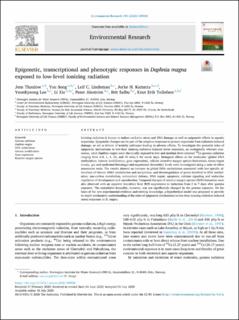Epigenetic, transcriptional and phenotypic responses in Daphnia magna exposed to low-level ionizing radiation
Thaulow, Jens; Song, You; Lindeman, Leif C; Kamstra, Jorke H; YeonKyeong, Lee; Xie, Li; Aleström, Peter; Salbu, Brit; Tollefsen, Knut-Erik
Peer reviewed, Journal article
Published version
Permanent lenke
https://hdl.handle.net/11250/2673500Utgivelsesdato
2020Metadata
Vis full innførselSamlinger
- Publikasjoner fra Cristin - NIVA [2160]
- Scientific publications [1172]
Sammendrag
Ionizing radiation is known to induce oxidative stress and DNA damage as well as epigenetic effects in aquatic organisms. Epigenetic changes can be part of the adaptive responses to protect organisms from radiation-induced damage, or act as drivers of toxicity pathways leading to adverse effects. To investigate the potential roles of epigenetic mechanisms in low-dose ionizing radiation-induced stress responses, an ecologically relevant crustacean, adult Daphnia magna were chronically exposed to low and medium level external 60Co gamma radiation ranging from 0.4, 1, 4, 10, and 40 mGy/h for seven days. Biological effects at the molecular (global DNA methylation, histone modification, gene expression), cellular (reactive oxygen species formation), tissue/organ (ovary, gut and epidermal histology) and organismal (fecundity) levels were investigated using a suite of effect assessment tools. The results showed an increase in global DNA methylation associated with loci-specific alterations of histone H3K9 methylation and acetylation, and downregulation of genes involved in DNA methylation, one-carbon metabolism, antioxidant defense, DNA repair, apoptosis, calcium signaling and endocrine regulation of development and reproduction. Temporal changes of reactive oxygen species (ROS) formation were also observed with an apparent transition from ROS suppression to induction from 2 to 7 days after gamma exposure. The cumulative fecundity, however, was not significantly changed by the gamma exposure. On the basis of the new experimental evidence and existing knowledge, a hypothetical model was proposed to provide in-depth mechanistic understanding of the roles of epigenetic mechanisms in low dose ionizing radiation induced stress responses in D. magna.

